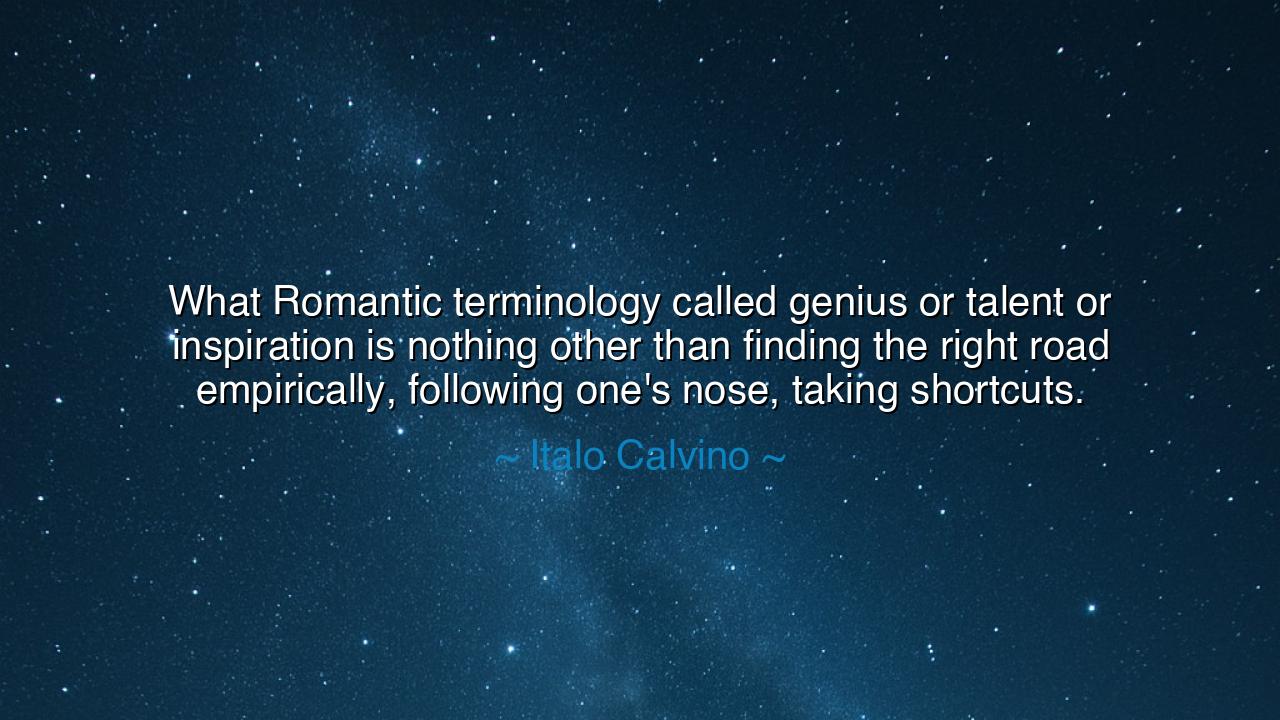
What Romantic terminology called genius or talent or inspiration
What Romantic terminology called genius or talent or inspiration is nothing other than finding the right road empirically, following one's nose, taking shortcuts.






Gather close, my children, and listen to the words of Italo Calvino, who, with clarity and insight, reminds us of the true nature of genius, talent, and inspiration. He said, "What Romantic terminology called genius or talent or inspiration is nothing other than finding the right road empirically, following one's nose, taking shortcuts." In these words, Calvino calls us to reconsider the romanticized view of creativity and instead embrace a more grounded and practical understanding. True genius, he suggests, is not some ethereal gift bestowed upon the few, but the result of empirical knowledge, intuition, and the willingness to forge one’s own path by trial and error.
In the ancient world, the Greeks understood that wisdom and knowledge were gained not through divine inspiration alone but through experience and observation. Socrates, that great philosopher, often said, "The unexamined life is not worth living." He believed that wisdom came from questioning, from seeking out the truth through constant reflection and experience, not by waiting for the divine spark of genius to strike. Likewise, Calvino invites us to see that talent is not simply a gift from the heavens, but the product of a mind that is willing to engage deeply with the world, to find shortcuts, and to pursue the path that works rather than the one that is expected.
Consider the story of Leonardo da Vinci, that great polymath whose genius is often attributed to divine inspiration. Yet, da Vinci was a man who worked tirelessly, experimenting with his art and his science, observing the world around him with meticulous care. His innovations were not born of a single moment of inspiration but were the result of years of study, observation, and trial. Da Vinci was a master of following his own instincts, forging his own path, and taking what others might have called shortcuts to reach new understandings. It was through this very empirical approach to life that Leonardo became the genius we admire today. His creativity was not some mysterious force; it was a result of his dedication to the process, and his ability to see the world not as it was, but as it could be.
In the Romantic era, figures like Byron and Shelley were often seen as inspired geniuses, touched by the muses and the sublime. Their creativity was regarded as something almost otherworldly, driven by deep emotions and a heightened sense of individualism. Yet, in Calvino’s view, this romantic notion of genius is limiting. He calls us to recognize that talent is not necessarily born of anguish or lofty ideals, but can often be the result of practical steps, of seeking the right path with diligence, and trusting one’s instincts. Talent, in this sense, is earned—it is a reward for those who commit to exploring, to experimenting, and to learning from failure as much as from success.
Think of the great scientists who reshaped our understanding of the world. Marie Curie, for example, did not discover radioactivity by chance or by the inspiration of a muse, but through years of careful, empirical work. She followed the path of inquiry, tirelessly testing and observing, guided not by a romantic notion of scientific brilliance, but by a pragmatic approach to the problem before her. Her inspiration was rooted not in grand, mystical moments, but in a methodical pursuit of truth. This, too, is what Calvino points to—the idea that the greatest innovations come from the willingness to question, to take the paths that others overlook, and to trust one’s intuition and reasoning.
And so, my children, let us take this wisdom and apply it to our own lives. Talent and creativity are not reserved for the few, nor are they mystical forces bestowed by chance. They are the fruits of empirical exploration, of embracing the process of trial and error. To be creative is not merely to wait for a flash of inspiration but to engage deeply with the world around you, to experiment, to learn from both success and failure, and to follow the path that makes sense, even if it means taking shortcuts others might not understand. Just as the ancients found their wisdom not in idle contemplation but in active engagement with the world, so too must we approach our creative endeavors with dedication and curiosity.
In your own lives, my children, do not seek to follow the paths of romanticized genius, but to build your own understanding, to experiment and learn from every experience. The road you seek may not always be clear, but it will reveal itself to you if you are willing to trust your instincts, take calculated risks, and persevere. The true genius is not the one who waits for inspiration, but the one who creates it through action, observation, and the relentless pursuit of knowledge. Remember, wisdom is not found in perfection, but in the willingness to stumble, to find the right road through trial, and to always seek the truth in all things.






AAdministratorAdministrator
Welcome, honored guests. Please leave a comment, we will respond soon